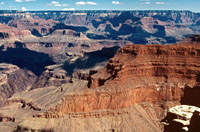
"Time is what stops everything happening all at once"*
| ESS 461 home |
| Information |
| Lecture notes |
| Labs |
| Research project |
| Term papers |
| Reading |
| Web resources |
| Footnotes |
| FAQ |
A few and quite well known observations on the science of geochronology. The most of them certain, the rest probable, all harmless, not especially strange and broadly established by a century of research.*
The span of geological time is vast - off in the realm of big-number physics and astronomy. It's often said to be beyond human comprehension, but in this class, we'll try.
The main aim of the class is to survey the clever methods used to tell geological time. As we go we'll put some precise numbers on significant events in the history of the Earth, the solar system and the cosmos. Along the way we'll encounter many other interesting topics: Nuclear stablity - why stars shine and uranium decays. Isotopic tracers - how they're used to track ocean circulation, date groundwater and measure geochemical reaction rates. Thermochronology - how leaky radioisotope systems (that don't keep accurate time) can be used to measure cooling and erosion rates in the upper crust. How fast DNA diverges.
And more.

